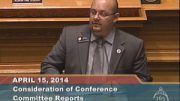By Jeffrey A. Roberts
CFOIC Executive Director
In body camera footage released to news outlets this week, a Denver police officer tells Colorado Independent Editor Susan Greene to stop taking pictures on a public sidewalk because the scene is “protected by HIPAA.”
“There’s also the First Amendment,” Greene says in the video, moments before she is handcuffed and put into the back of a police car. “Have you heard of it?”
“That doesn’t supersede HIPAA,” the officer responds. “It doesn’t supersede HIPAA. Step away or you’ll be arrested for interference.”
HIPAA is the federal Health Insurance Portability and Accountability Act, enacted by Congress in 1996. The law’s privacy rules, designed to protect the confidential health information of patients, often are misunderstood and misapplied, and that certainly seems to be the case with the July 5 detention of Greene near the state Capitol, according to legal experts.
Officer James Brooks confronted Greene while she used her smartphone to photograph him and other officers with a nearly naked, handcuffed man seated on the sidewalk.
“It is a legal impossibility for a journalist to violate HIPAA, period,” said Frank LoMonte, a lawyer who directs the Brechner Center for Freedom of Information at the University of Florida.
In an email to the Colorado Freedom of Information Coalition, LoMonte noted that HIPAA is a “very narrow” federal statute that applies to health care professionals and insurance carriers that receive money from Medicare and Medicaid. Covered entities, according to the U.S. Department of Health & Human Services, include health plans, health care clearinghouses and health care providers “who conduct certain financial and administrative transactions electronically.”
“HIPAA makes it unlawful for one of those people – a doctor, a hospital, an insurance company – to give out the contents of confidential patient records, and that’s all it does,” LoMonte explained. “It has no relevance at all to the behavior of non-medical bystanders, even if someone is receiving medical treatment. It is always, always wrong for law enforcement agents to cite HIPAA as a basis for interfering with news coverage, and there is no excuse for not knowing that.”
Adam Marshall, a staff attorney with the Reporters Committee for Freedom of the Press, watched the video of Greene’s handcuffing. He told CFOIC he has “no idea how HIPAA would apply with respect to a journalist filming police who are detaining someone on a public street. I don’t think it has any application. It’s mixing totally inapplicable frameworks and provisions together.”
Did the presence of an ambulance on the scene somehow trigger HIPAA’s privacy restrictions? No, according to the attorneys.
“It doesn’t apply to things you can just see walking down the street,” Marshall said.
Journalists and the general public have a First Amendment right to photograph and record police activities as long as they aren’t interfering with officers. The Colorado legislature affirmed that right in 2015, passing a bill that allows for a civil suit against a law enforcement agency if an officer seizes or destroys a recording without a person’s consent or “intentionally interferes with the person’s lawful attempt to record an incident involving a peace officer.”
“There is no ‘invasion of privacy’ in photographing or videotaping a news event taking place in an area that is open to foot traffic,” LoMonte told CFOIC. “If a pedestrian can walk there, then a journalist can film there. As long as journalists don’t physically get underfoot as police or paramedics are trying to administer aid, they’re doing nothing wrong by recording a news event.”

From left: Colorado Independent Editor Susan Greene and attorneys Mari Newman and Andy McNulty
Attorney Marc Flink, a CFOIC board member, has sent two letters to Denver officials regarding Greene’s handcuffing on behalf of the coalition, the Colorado Press Association and the Colorado Broadcasters Association. The letters called on Chief Paul Pazen, Manager of Safety Troy Riggs and City Attorney Kristin Bronson to step up First Amendment training for employees.
Pazen wrote back that upholding the First Amendment rights of individuals “is of the utmost importance” to Denver police and that officers already receive training in constitutional issues. An internal investigation is still ongoing, according to an update published by Denver police this week. The department, it says, “recently reiterated to officers the relevant policies involving First Amendment considerations.”
Last week, Denver District Attorney Beth McCann notified Greene that her office is not pursuing charges against Brooks. At a news conference Wednesday, Greene and two lawyers representing her and The Colorado Independent said they are considering legal action against the city.
Follow the Colorado Freedom of Information Coalition on Twitter @CoFOIC. Like CFOIC’s Facebook page. Do you appreciate the information and resources provided by CFOIC? Please consider making a tax-deductible donation.




